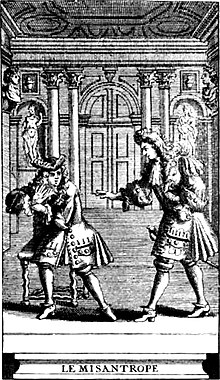
Back بغض البشرية Arabic Misantropía AST Mizantropiya AZ Mėzantruopėjė BAT-SMG Мизантропия Bulgarian Misantropia Catalan کینەی مرۆیی CKB Misantropie Czech Misantropi Danish Misanthropie German

Misanthropy is the general hatred, dislike, or distrust of the human species, human behavior, or human nature. A misanthrope or misanthropist is someone who holds such views or feelings. Misanthropy involves a negative evaluative attitude toward humanity that is based on humankind's flaws. Misanthropes hold that these flaws characterize all or at least the greater majority of human beings. They claim that there is no easy way to rectify them short of a complete transformation of the dominant way of life. Various types of misanthropy are distinguished in the academic literature based on what attitude is involved, at whom it is directed, and how it is expressed. Either emotions or theoretical judgments can serve as the foundation of the attitude. It can be directed toward all humans without exception or exclude a few idealized people. In this regard, some misanthropes condemn themselves while others consider themselves superior to everyone else. Misanthropy is sometimes associated with a destructive outlook aiming to hurt other people or an attempt to flee society. Other types of misanthropic stances include activism by trying to improve humanity, quietism in the form of resignation, and humor mocking the absurdity of the human condition.
The negative misanthropic outlook is based on different types of human flaws. Moral flaws and unethical decisions are often seen as the foundational factor. They include cruelty, selfishness, injustice, greed, and indifference to the suffering of others. They may result in harm to humans and animals, such as genocides and factory farming of livestock. Other flaws include intellectual flaws, like dogmatism and cognitive biases, as well as aesthetic flaws concerning ugliness and lack of sensitivity to beauty. Many debates in the academic literature discuss whether misanthropy is a valid viewpoint and what its implications are. Proponents of misanthropy usually point to human flaws and the harm they have caused as a sufficient reason for condemning humanity. Critics have responded to this line of thought by claiming that severe flaws concern only a few extreme cases, like mentally ill perpetrators, but not humanity at large. Another objection is based on the claim that humans also have virtues besides their flaws and that a balanced evaluation might be overall positive. A further criticism rejects misanthropy because of its association with hatred, which may lead to violence, and because it may make people friendless and unhappy. Defenders of misanthropy have responded by claiming that this applies only to some forms of misanthropy but not to misanthropy in general.
A related issue concerns the question of the psychological and social factors that cause people to become misanthropes. They include socio-economic inequality, living under an authoritarian regime, and undergoing personal disappointments in life. Misanthropy is relevant in various disciplines. It has been discussed and exemplified by philosophers throughout history, like Heraclitus, Diogenes, Thomas Hobbes, Jean-Jacques Rousseau, Arthur Schopenhauer, and Friedrich Nietzsche. Misanthropic outlooks form part of some religious teachings discussing the deep flaws of human beings, like the Christian doctrine of original sin. Misanthropic perspectives and characters are also found in literature and popular culture. They include William Shakespeare's portrayal of Timon of Athens, Molière's play The Misanthrope, and Gulliver's Travels by Jonathan Swift. Misanthropy is closely related to but not identical to philosophical pessimism. Some misanthropes promote antinatalism, the view that humans should abstain from procreation.[1][2]
- ^ Benatar 2015, pp. 34–64.
- ^ MacCormack 2020, p. 143.